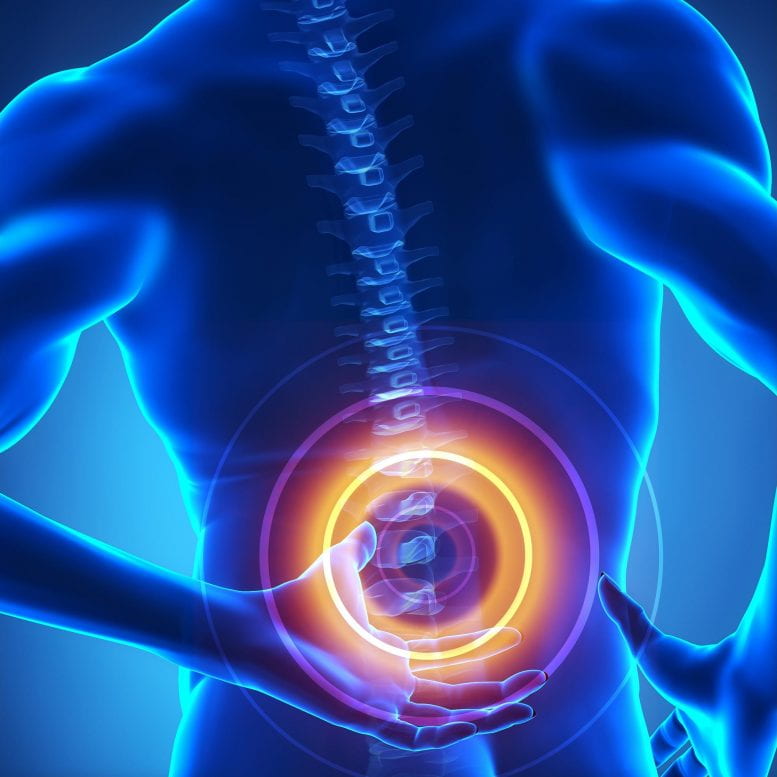Our new study, “Effect of Pain Reprocessing Therapy vs Placebo and Usual Care for Patients With Chronic Back Pain: A Randomized Clinical Trial” shows that Psychological treatment centered on changing patients’ beliefs about the causes and threat value of pain may provide substantial and durable pain relief for people with chronic back pain!
The findings provide some of the strongest evidence yet that a psychological treatment can provide potent and durable relief for chronic pain, which afflicts one in five Americans.

“For a long time we have thought that chronic pain is due primarily to problems in the body, and most treatments to date have targeted that,” said lead author Yoni Ashar, who conducted the study while earning his Ph.D. in the Department of Psychology and Neuroscience at CU Boulder. “This treatment is based on the premise that the brain can generate pain in the absence of injury or after an injury has healed, and that people can unlearn that pain. Our study shows it works.”
Dartmouth News: In Chronic Pain? Changing Your Attitude May Give Relief
U.S.News: Special Therapy Brings Relief to Patients With Chronic Back Pain
CU Boulder Today: How therapy, not pills, can nix chronic pain and change the brain
Denver7 – The Denver Channel: CU Boulder research shows benefits of pain reprocessing therapy
Altmetric News: Effect of Pain Reprocessing Therapy vs Placebo and Usual Care for Patients With Chronic Back Pain
SciTechDaily: Rethinking What Causes Pain: Psychological Treatment Shown To Yield Strong, Lasting Pain Relief
Science Daily: Back pain: Psychological treatment shown to yield strong, lasting pain relief, alter brain networks
Florida News Times: Psychotherapy that has been shown to provide powerful and lasting pain relief and alter brain networks
The Irish News: Give patients with back pain therapy – study suggests
The Sunday Times: Pain reprocessing therapy helps with chronic back pain
Video interviews with participants randomized to PRT
The magnitude and durability of pain reductions we saw are very rarely observed in chronic pain treatment trials,” Ashar said, noting that opioids have yielded only moderate and short-term relief in many trials.
The study found that two-thirds of chronic back pain patients who underwent a four-week psychological treatment called Pain Reprocessing Therapy (PRT) were pain-free or nearly pain-free post-treatment. And most maintained relief for one year.
Importance Chronic back pain (CBP) is a leading cause of disability, and treatment is often ineffective. Approximately 85% of cases are primary CBP, for which peripheral etiology cannot be identified, and maintenance factors include fear, avoidance, and beliefs that pain indicates injury.
Objective To test whether a psychological treatment (pain reprocessing therapy [PRT]) aiming to shift patients’ beliefs about the causes and threat value of pain provides substantial and durable pain relief from primary CBP and to investigate treatment mechanisms.
Design, Setting, and Participants This randomized clinical trial with longitudinal functional magnetic resonance imaging (fMRI) and 1-year follow-up assessment was conducted in a university research setting from November 2017 to August 2018, with 1-year follow-up completed by November 2019. Clinical and fMRI data were analyzed from January 2019 to August 2020. The study compared PRT with an open-label placebo treatment and with usual care in a community sample.
Interventions Participants randomized to PRT participated in 1 telehealth session with a physician and 8 psychological treatment sessions over 4 weeks. Treatment aimed to help patients reconceptualize their pain as due to nondangerous brain activity rather than peripheral tissue injury, using a combination of cognitive, somatic, and exposure-based techniques. Participants randomized to placebo received an open-label subcutaneous saline injection in the back; participants randomized to usual care continued their routine, ongoing care.
Main Outcomes and Measures One-week mean back pain intensity score (0 to 10) at posttreatment, pain beliefs, and fMRI measures of evoked pain and resting connectivity.
Results At baseline, 151 adults (54% female; mean [SD] age, 41.1 [15.6] years) reported mean (SD) pain of low to moderate severity (mean [SD] pain intensity, 4.10 [1.26] of 10; mean [SD] disability, 23.34 [10.12] of 100) and mean (SD) pain duration of 10.0 (8.9) years. Large group differences in pain were observed at posttreatment, with a mean (SD) pain score of 1.18 (1.24) in the PRT group, 2.84 (1.64) in the placebo group, and 3.13 (1.45) in the usual care group. Hedges g was −1.14 for PRT vs placebo and −1.74 for PRT vs usual care (P < .001). Of 151 total participants, 33 of 50 participants (66%) randomized to PRT were pain-free or nearly pain-free at posttreatment (reporting a pain intensity score of 0 or 1 of 10), compared with 10 of 51 participants (20%) randomized to placebo and 5 of 50 participants (10%) randomized to usual care. Treatment effects were maintained at 1-year follow-up, with a mean (SD) pain score of 1.51 (1.59) in the PRT group, 2.79 (1.78) in the placebo group, and 3.00 (1.77) in the usual care group. Hedges g was −0.70 for PRT vs placebo (P = .001) and −1.05 for PRT vs usual care (P < .001) at 1-year follow-up. Longitudinal fMRI showed (1) reduced responses to evoked back pain in the anterior midcingulate and the anterior prefrontal cortex for PRT vs placebo; (2) reduced responses in the anterior insula for PRT vs usual care; (3) increased resting connectivity from the anterior prefrontal cortex and the anterior insula to the primary somatosensory cortex for PRT vs both control groups; and (4) increased connectivity from the anterior midcingulate to the precuneus for PRT vs usual care.
Conclusions and Relevance Psychological treatment centered on changing patients’ beliefs about the causes and threat value of pain may provide substantial and durable pain relief for people with CBP.
Trial Registration ClinicalTrials.gov Identifier: NCT03294148.
Access Article Here
